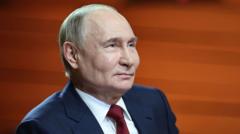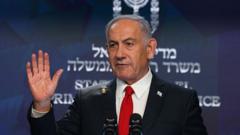As Israel grapples with mounting diplomatic backlash and sanctions from its allies over the Gaza conflict, former President Donald Trump has chosen not to weigh in on the crisis, leaving many observers questioning his stance.**
Israel Faces Diplomatic Isolation Amidst Gaza Conflict**

Israel Faces Diplomatic Isolation Amidst Gaza Conflict**
Surge in International Condemnation as Grenade of Sanctions and Criticism Launched at Israeli Government Yet Trump Remains Silent**
Amid escalating tensions and condemnation surrounding the Gaza crisis, Israel finds itself facing significant international backlash. A headline from Israel's left-leaning Ha'aretz noted the alarming "diplomatic tsunami" brewing as European nations began to confront the Jewish state's actions, described as “complete madness” in Gaza. This week has proven tumultuous for Israel, impacted by a combination of fierce international criticism and tragic attacks on its citizens.
The diplomatic storm gained momentum on Monday when Britain, France, and Canada issued a collaborative statement denouncing what they termed "egregious" actions in Gaza. The nations warned Israel of potential "targeted sanctions" should the military offensive continue and humanitarian aid restrictions remain in place. Globally, more voices joined the chorus of dissent, with 24 donor nations condemning a newly proposed Israeli aid delivery method to Gaza.
The United Kingdom has taken further drastic steps, suspending trade talks with Israel and initiating a review of ongoing cooperation plans. The foreign office summoned Israel's ambassador - a diplomatic measure traditionally reserved for nations typically viewed in an adversarial light. Meanwhile, the EU's foreign affairs chief, Kaja Kallas, expressed that a "strong majority" of member states wish to reevaluate the longstanding Association Agreement with Israel.
The urgency behind this diplomatic backlash is exacerbated by the dire humanitarian situation in Gaza, with reports indicating a looming catastrophe akin to mass starvation. Comments from Israel’s Finance Minister Bezalel Smotrich, which called for a “cleaning” of Gaza, prompted UK Foreign Secretary David Lammy to denounce such rhetoric as extreme, dangerous, and grotesque.
Facing increasing isolation, Israeli Prime Minister Benjamin Netanyahu reacted sharply to the mounting international pressure, accusing Britain, France, and Canada of siding with Hamas. He voiced that their responses would only validate the actions of “mass murderers” and reflect a fundamental misalignment with justice.
This moment has prompted UK Prime Minister Sir Keir Starmer to publicly reassess his support of Israel following intense criticism for not advocating for a ceasefire earlier. He expressed that the suffering of innocent Gazan children is "utterly intolerable," marking a significant stance from a longstanding ally of Israel.
Simultaneously, in the shadow of these events, the United States remains noticeably restrained, particularly with former President Donald Trump maintaining a conspicuous silence amidst the turmoil. During a recent tour of the Gulf, Trump acknowledged the stark humanitarian situation yet has opted not to engage in the international dialogue surrounding the Israeli-Palestinian conflict. With the silence from Trump, who once held significant sway over U.S. foreign policy, many are left pondering his position in the current crisis.





















